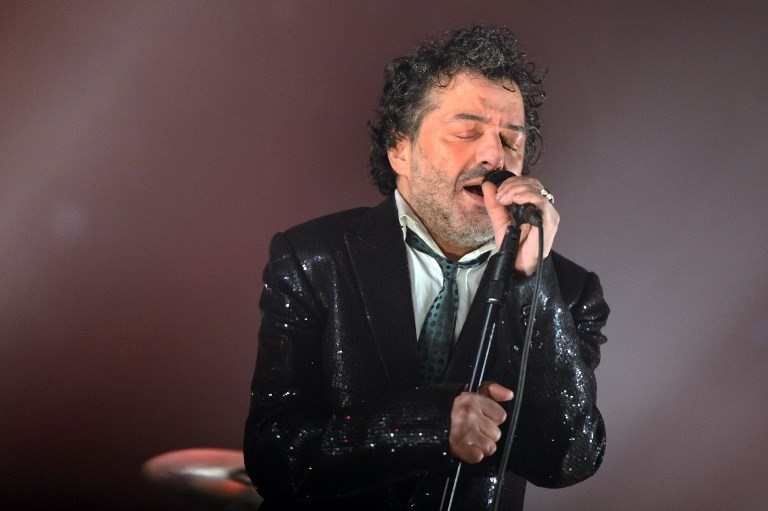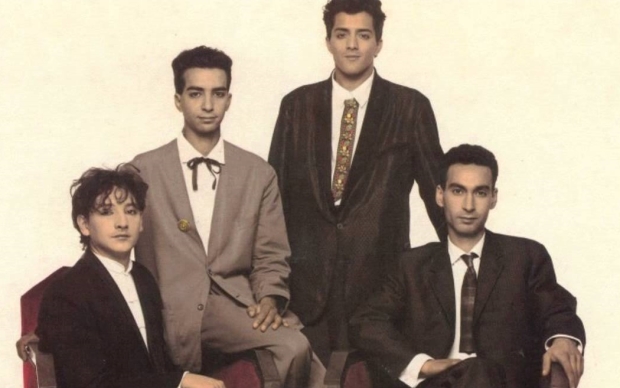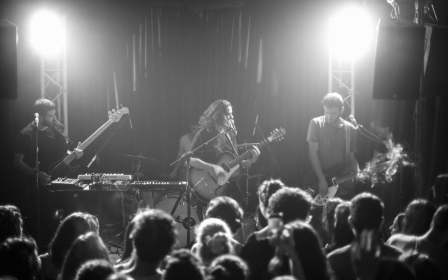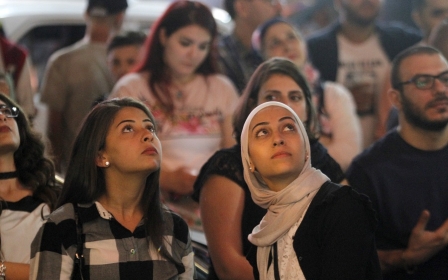Remembering Rachid Taha, voice of the oppressed and dispossessed

The death of Algerian singer Rachid Taha last month brought great heaviness to our hearts, not just because of his ground-breaking contributions to music, but also because for the Algerian diaspora, as well as many others of the global south, he so powerfully articulated our experiences of anger towards a racist Western society and our longing for the homeland.
Oh where are you going?
Eventually you must come back
How many ignorant people have regretted this
Before you and me
Taha sang these words in his version of Ya Rayah (Oh emigrant/traveller), a chaabi (folk or traditional style) song written by Dahmane El Harrachi in 1973, which speaks of the difficult journey made by countless immigrants, and their pain at being separated from their homeland - in this case Algeria.
The guilt, the regret, the shame
Within a few lines, whether playing over the radio or live on stage, audiences would be found weeping as his voice and all that it evoked. Here were the stories of those who had come before them, who made the journey to lands that rejected, exploited and brutalised them. Even for second, third and fourth generations of North Africans in Europe, the song was almost a compilation of the hundreds of conversations and arguments heard in the family or community.
The guilt, the regret, the shame that came with their journey, which may have felt like the betrayal of a homeland whose freedom had cost countless people of the Maghreb their lives.
How many overpopulated countries and empty lands have you seen?
How much time have you wasted?
How much have you yet to lose?
Oh emigrant in the country of others
Do you even know what's going on?
Destiny and time follow their course but you ignore it
The Sunday Times accurately described him in their headline as a Musician who became a voice for immigrants, a title he maintained not through awards and accolades but through his uncompromising political stand in solidarity with oppressed groups, wherever they may be. His Voilà, Voilà, in which he railed against fascism and the rise of the National Front, was described as "a flame-fisted techno-rant against the rise of the extreme right in France".
Highlighting migrants' mistreatment
Born in 1958 near Oran, in the northwest of Algeria, Rachid Taha was brought up against the backdrop of his country's war of independence. His family moved in 1968 to Lyon, France, where from the age of 10 he witnessed his father’s exploitation as a textile worker along with so many other North African immigrants at the time.
In 1981, he formed the band Carte de Séjour (Residence Permit) alongside Mohammed and Mokhtar Amini, Djamel Dif and Eric Vaquer. Named to describe the precariousness of a migrant’s status, the group went on to create a hybrid of Arabic music and punk that highlighted the mistreatment of migrants and their day-to-day working conditions. These were songs about being overworked and underpaid, like Taha’s father.
Even up until his death, at his home in the outskirts of Paris, Taha remained an immigrant. One of the lines that was repeated to me over and over again during a recent trip to Algeria was that he "always refused to take up French citizenship".
As family and friends across different cities from east to west mourned his passing, they would proudly repeat this fact as a testament to his political integrity. Taha would not be made to feel inferior because of where he came from, and always, no matter how far from home, he remained Algerian. The singer confirmed that he chose not to request French nationality in memory of his uncle who was killed by the French military during the colonisation of Algeria.
Hearing of Rachid Taha’s fatal heart attack, just before my departure to Algiers, added to the overwhelming feeling of suspension between a country that is still my home and that I was forced to leave at the age of seven, and the one in which I have built my life.
I could hear his lyrics in my head;
Why is your heart so sad?
And why are you staying there miserable?
Hardship will end and you no longer learn or build anything
The days don't last, just as your youth and mine didn't
Neither accepted nor recognised
The singer spoke to a struggle that included a fear of not being accepted or recognised in his home country, perhaps due to his unconventional approach to his music, life and politics. Regardless, his performances in the successful rai concert 1, 2, 3 Soleils in Paris, alongside rai superstars Khaled and Faudel, accompanied by an Egyptian orchestra, was a hugely defining moment for the North African diaspora.
In his later years, he released a definitive Arabic cover version of The Clash's Rock the Casbah - playing often with the iconic British band's guitarist Mick Jones - and joined the collective Africa Express, made up a number of famous musicians from across the continent.
Taha's impact on the music and political movements in France, Algeria and Europe was incalculable. From his committed opposition to homophobia and racism, to his principled rejection of repressive regimes across the board, Taha's life was defined by his decision to always stand with the downtrodden, the rejected, the weak.
He even named the nightclub he founded Les Refoulés (The Rejects). This commitment, in the end, took its toll. Both his physical and mental health bore the brunt of always swimming against the tide, always running head first into the brick walls of power and oppression. Those who saw him towards the end were struck by how much alcohol and ill health had broken our hero.
The struggle took its pound of flesh from him, but he leaves the world a better, more illuminated place for having graced it with his presence. Once upon a time, Rachid Taha sang:
Oh sleeper, your news reached me
And what happened to you happened to me
Thus, the heart returns to its creator, the Highest (God)
He was a rockstar. He was a hero. He was of the people and he fought constantly for them.
Rest in power brother, Allah y’arham.
-Malia Bouattia is an activist, the former president of the National Union of Students, co-founder of the Students Not Suspects/Educators not Informants Network and presenter/panellist on British Muslim TV's Women Like Us.
The views expressed in this article belong to the author and do not necessarily reflect the editorial policy of Middle East Eye.
Photo: In this file photo taken on 7 December, 2012 Algerian singer Rachid Taha performs on stage during the 34th Trans Musicales Music Festival in Rennes, western France (AFP).
This article is available in French on Middle East Eye French edition.
New MEE newsletter: Jerusalem Dispatch
Sign up to get the latest insights and analysis on Israel-Palestine, alongside Turkey Unpacked and other MEE newsletters
Middle East Eye delivers independent and unrivalled coverage and analysis of the Middle East, North Africa and beyond. To learn more about republishing this content and the associated fees, please fill out this form. More about MEE can be found here.







